小程序微信小程序自定义组件Component详细总结
Posted 前端小媛
tags:
篇首语:本文由小常识网(cha138.com)小编为大家整理,主要介绍了小程序微信小程序自定义组件Component详细总结相关的知识,希望对你有一定的参考价值。
1- 前言
在本文中你将收获
- 小程序如何使用自定义组件
- 自定义组件之间的传值
- 自定义组件中插槽的使用
2- 组件文件新建
2.1 定义组件
在根目录新建components文件夹,建立cell 文件夹,右击创建cell的Component组件
- cell.js
- cell.wxml
- cell.json
- cell.wxss
2.2 注册组件
页面的xxx.json ,usingComponent注册
"usingComponents":
"item":"/components/item/item"
2.3 使用组件
<item></item>
2.4 图参考
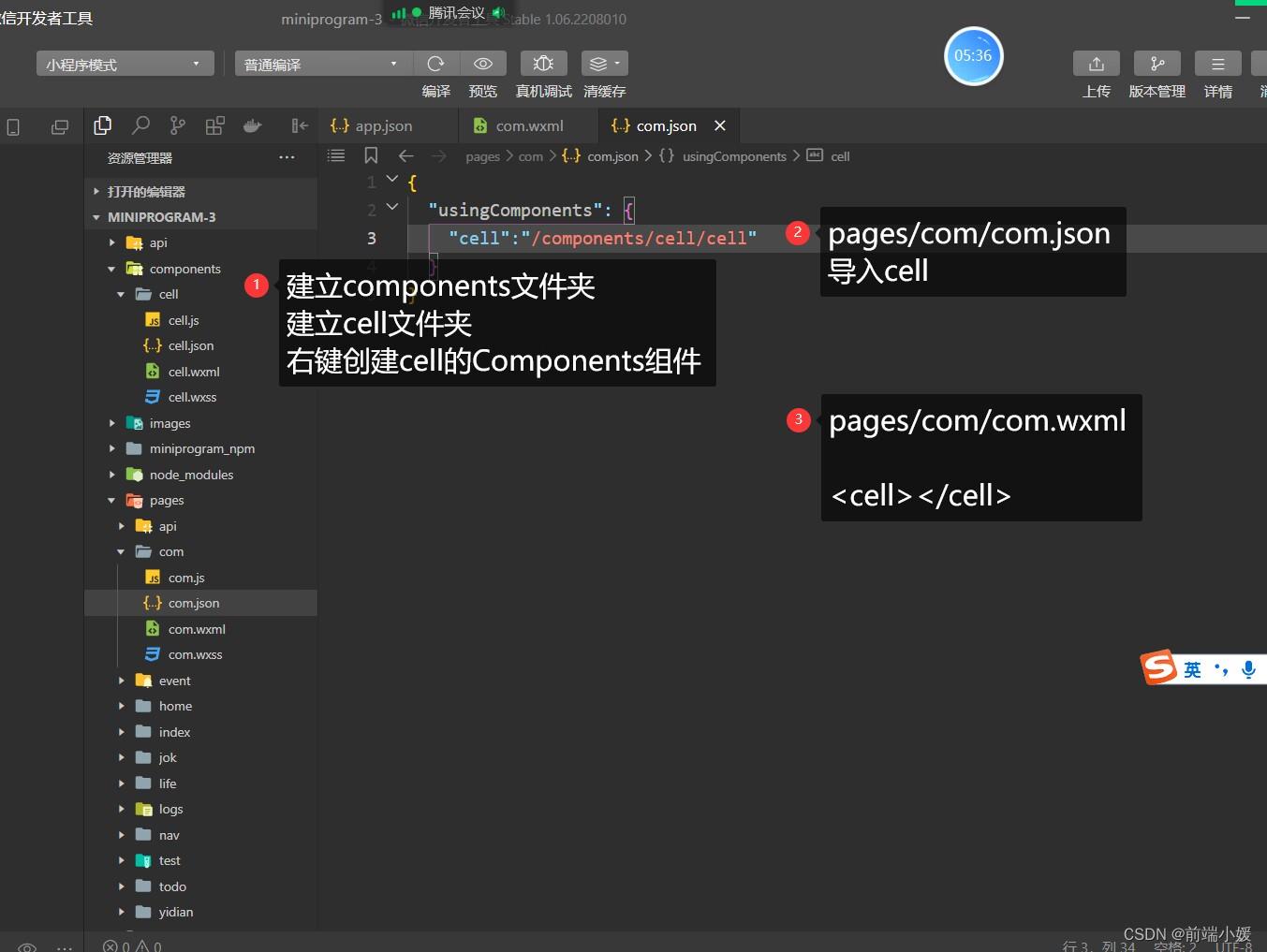
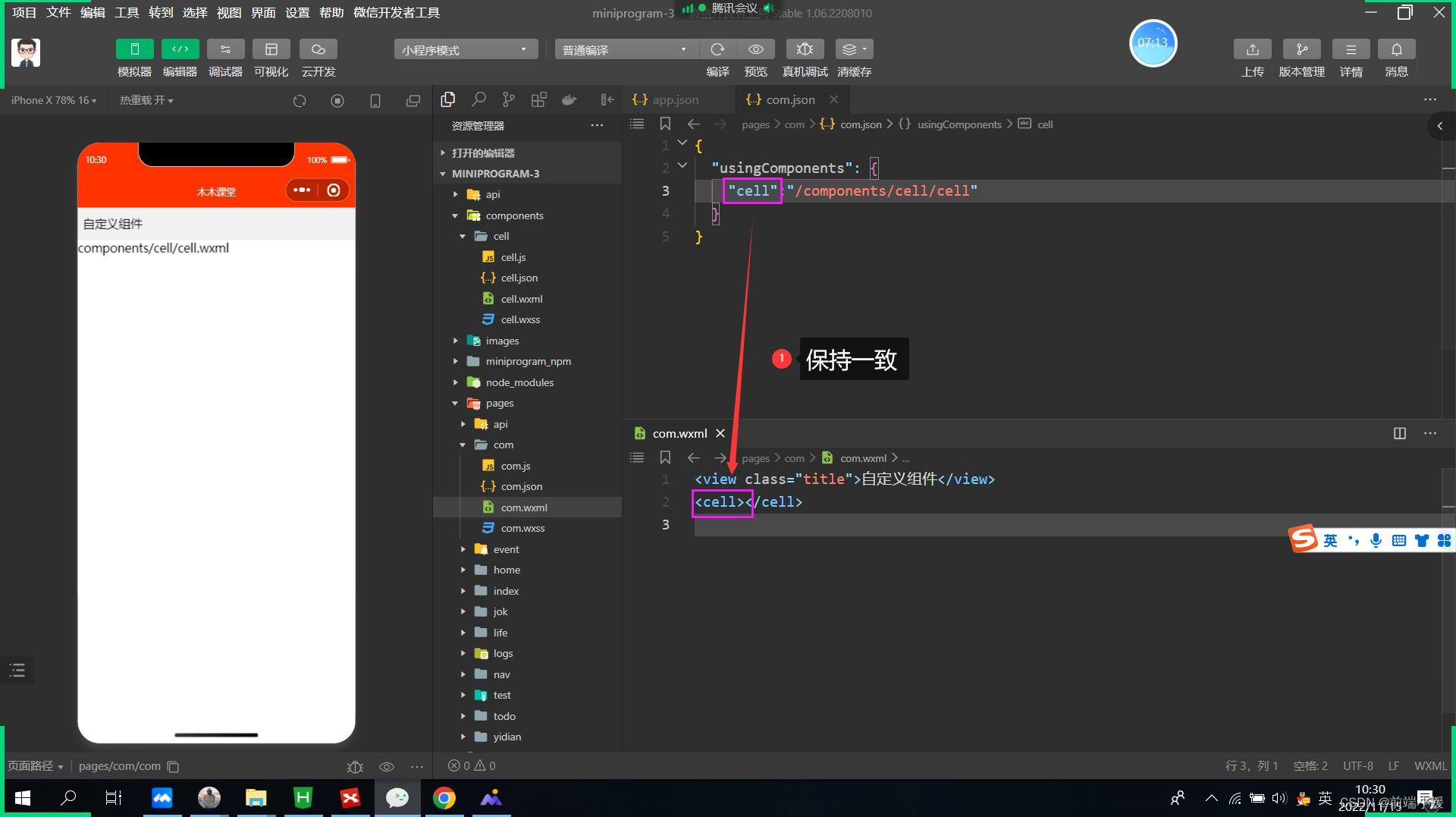
3- 外部类和样式隔离
3.1定义组件
- cell.wxml 文件
<view class="cell cell-class">
</view>
- cell.wxss
/* pages/com/com.wxss */
.cell
color: tomato;
.mycell
color: #f70;
line-height: 120rpx !important;
- cell.js 文件
/* 选项 */
options:
/* 样式隔离:apply-shared 父影响子
shared 父子相互影响 isolated 相互隔离
*/
styleIsolation:'isolated',
,
//通过组件的外部类实现父组件控制自己的样式
externalClasses:["cell-class"],
3.2 使用组件
<cell></cell>
<cell cell-class="mycell"></cell>

3.3 图解释
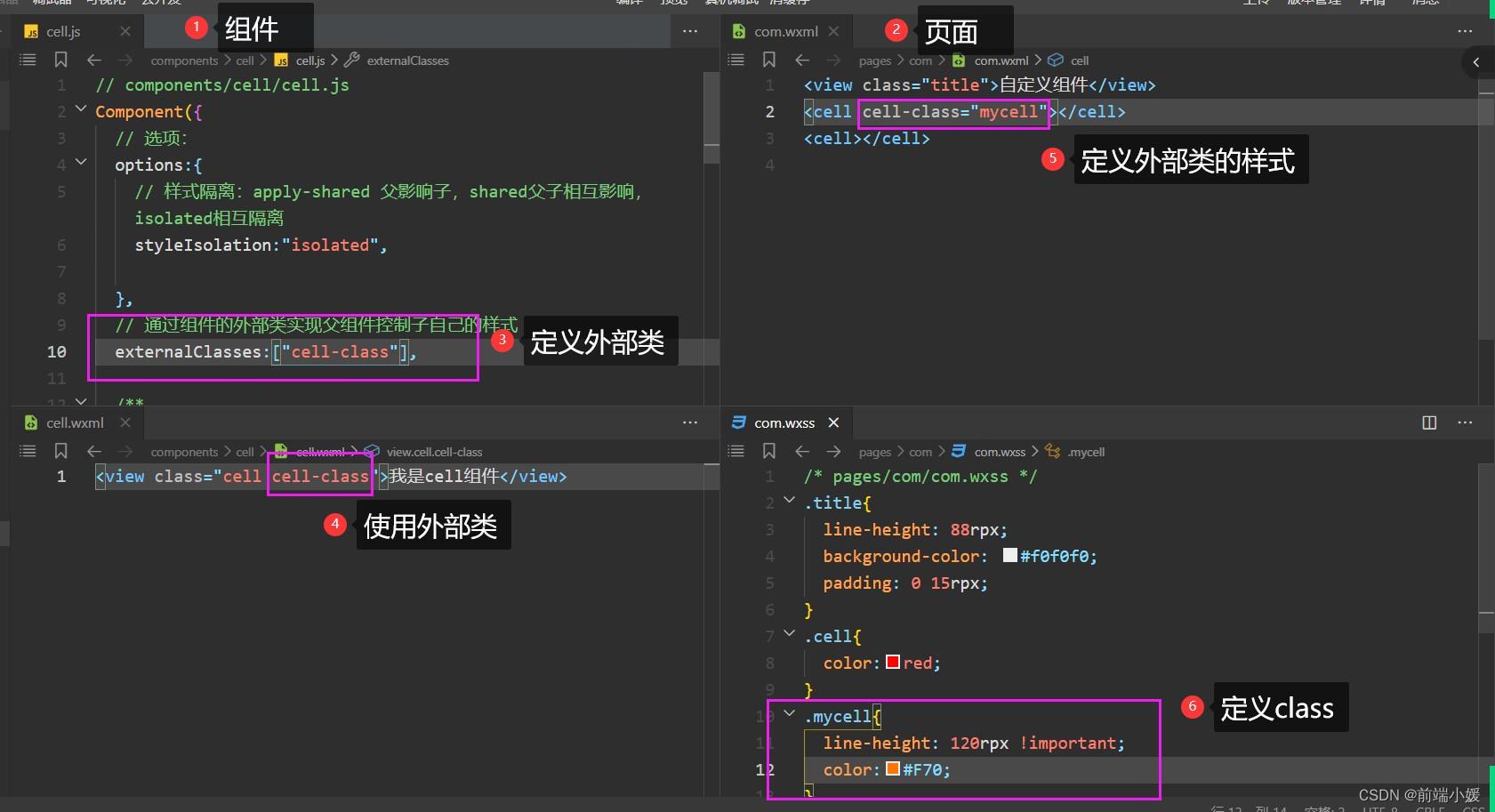
4- 组件插槽
4.1 默认插槽
- cell.wxml
<view class="cell">
我是cell组件
<slot></slot>
</view>
- cell.js
/* 选项 */
options:
//允许多个插槽
multipleSlots:true,
,
- cell.wxss
.cell
height: 88rpx;
line-height: 88rpx;
border-bottom: 1rpx solid #cccccc;
使用cell组件
<cell>
<text>放假</text>
<text>快点到来</text>
</cell>

4.2 命名多插槽
- cell.wxml
<view class="cell cell-class">
<slot name="pre"></slot>
我是cell组件
<slot></slot>
<slot name="next"></slot>
</view>
- cell.js
/* 选项 */
options:
//允许多个插槽
multipleSlots:true,
,
- cell.wxss
.cell
height: 88rpx;
line-height: 88rpx;
border-bottom: 1rpx solid #cccccc;
- com.wxml
<!-- 插槽 -->
<cell>
<text slot="pre">🐱👓</text>
<text slot="next">🐱🚀</text>
<text>放假</text>
<text>快点到来</text>
</cell>
<cell cell-class="mycell">
<text slot="next">🎉</text>
<text slot="pre">🐱</text>
<text>做核酸</text>
<text>今天要做</text>
</cell>
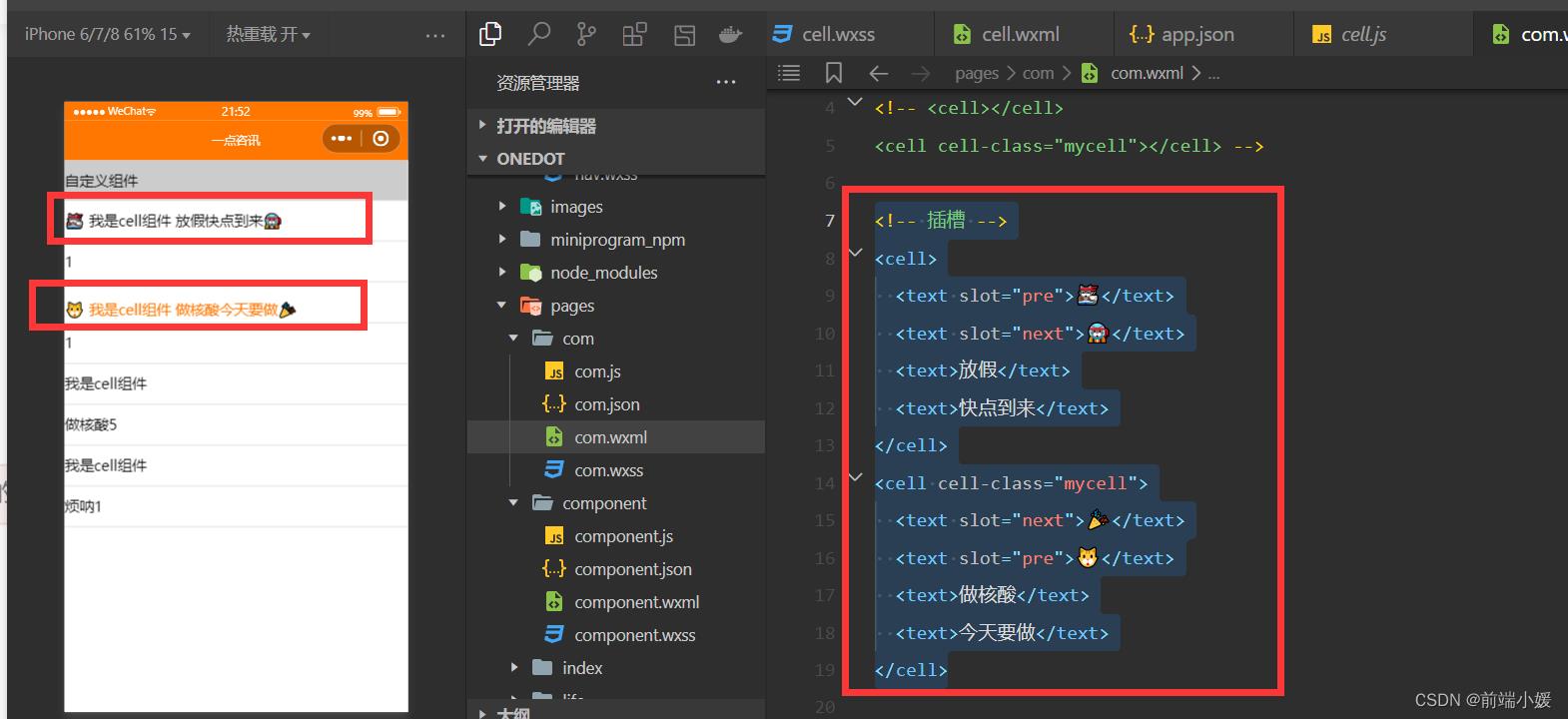
5- 组件传参
5.1 父传子
5.1.1 定义组件
- cell.wxml
<view class="cell">
<text>title</text>
<text>num</text>
</view>
- cell.js
// components/cell/cell.js
Component(
/* 选项 */
options:
/* 样式隔离:apply-shared 父影响子
shared 父子相互影响 isolated 相互隔离
*/
styleIsolation:'isolated',
//允许多个插槽
multipleSlots:true,
,
/**
* 组件的属性列表
*/
properties:
title:
type:String,
value:""
,
num:
type:Number,
value:1
,
/**
* 组件的初始数据
*/
data:
//定义组件自己的数据count
count:1
,
/**
* 组件的方法列表
*/
)
5.1.2 使用组件
- com.wxml
<cell title="做核酸" num="5"></cell>
<cell title="烦呐"></cell>
5.1.3 图解
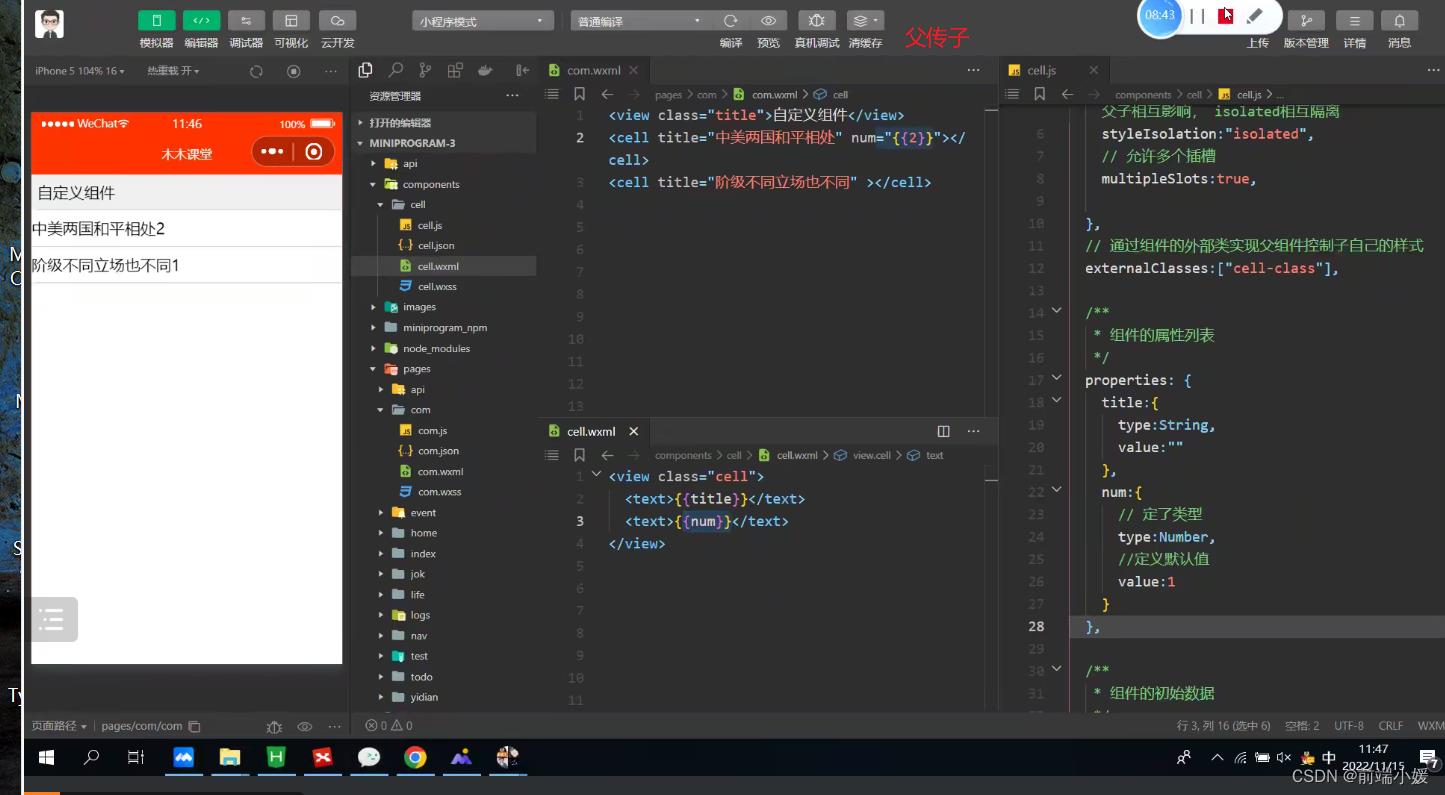
5.2 子传参父
5.2.1 定义组件
- cell.wxml
<view class="cell" bindtap="tapHd">
<text>title</text>
<text>count</text>
</view>
- cell.js
// components/cell/cell.js
Component(
/* 选项 */
options:
/* 样式隔离:apply-shared 父影响子
shared 父子相互影响 isolated 相互隔离
*/
styleIsolation:'isolated',
//允许多个插槽
multipleSlots:true,
,
/**
* 组件的属性列表
*/
properties:
title:
type:String,
value:""
,
num:
type:Number,
value:1
,
/**
* 组件的初始数据
*/
data:
//定义组件自己的数据count
count:1
,
lifetimes:
//在组件生命周期attached挂载更新count
attached()
console.log(this.data);
//count 的值为父组件传递的num值
this.setData(count:this.data.num)
,
/**
* 组件的方法列表
*/
methods:
tapHd()
this.setData(count:this.data.count+5)
//发送一个事件
this.triggerEvent("cellclick",this.data.count)
)
5.2.2 使用组件
- com.wxml
<view class="cell" bindtap="tapHd">
<text>title</text>
<text>count</text>
</view>
5.2.3 图解
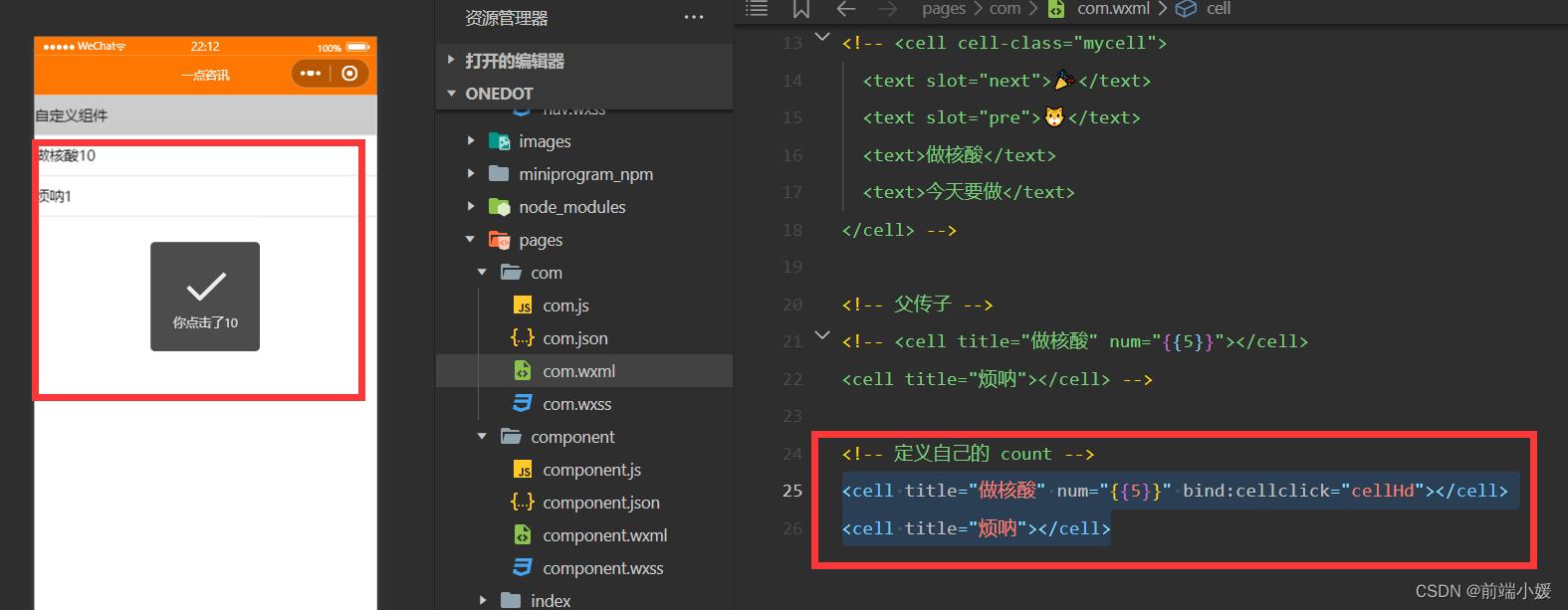
6- 案例item组件
6.1 定义组件
- 首先在根目录下创建一个专门放自定义组件的文件夹;
- 然后在小程序编辑器里,右键,新建Component;
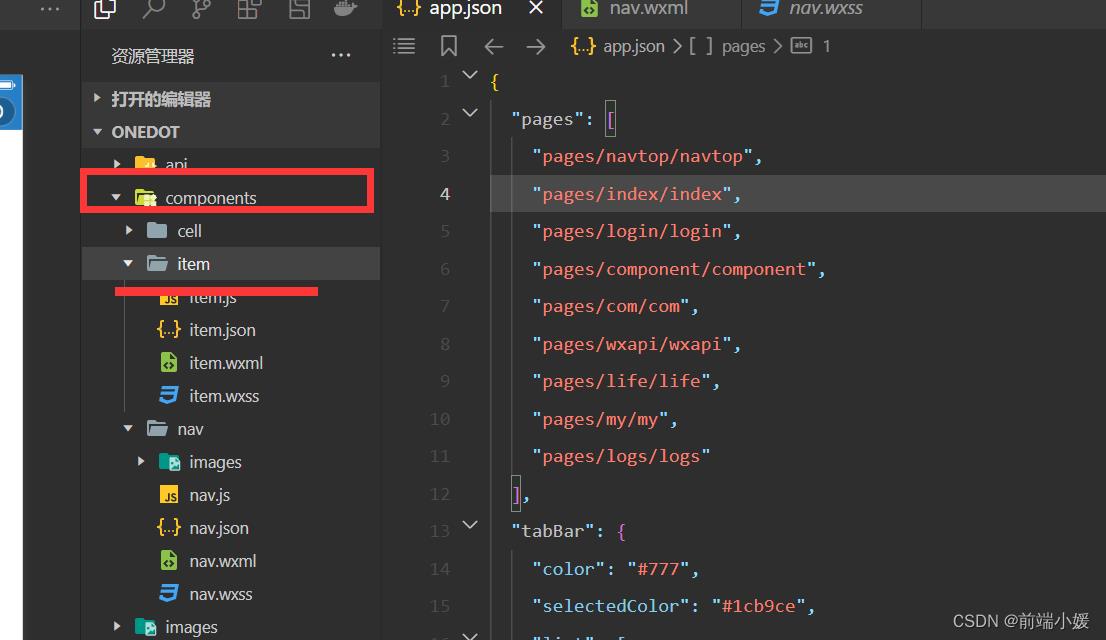
<!--components/item/item.wxml-->
<navigator class="item itemclass" url="url" open-type="openType" bindtap="itemclick">
<view class="icon" wx:if="icon">
<image src="icon" mode="aspectFill"/>
</view>
<view class="content">
<view class="title" wx:if="title">
title
</view>
<slot name="title" wx:else ></slot>
<view class="right" wx:if="!showrslot">
<view class="tip">tip</view>
<view class="badge" wx:if="badge">
<view wx:if="badge===true" class="dot"> </view>
<view wx:else class="redbadge">badge</view>
</view>
<view class="arrow"></view>
</view>
<slot name="right" wx:else></slot>
</view>
</navigator>
/* components/item/item.wxss */
.item
line-height: 88rpx;
display: flex;
align-items: center;
justify-content: space-between;
.icon
margin-left: 30rpx;
margin-right: 30rpx;
height: 100%;
display: flex;
align-items: center;
.icon image
width: 60rpx;
height: 60rpx;
.content
padding: 0 30rpx;
border-bottom: 1rpx solid #ccc;
display: flex;
flex: 1;
.title
flex: 1;
color: #333;
font-size: 35rpx;
.right
display: flex;
align-items: center;
.right .arrow
height: 25rpx;
width: 25rpx;
border-top: 3rpx solid #999;
border-right: 3rpx solid #999;
transform: rotate(45deg);
.tip
color: #999;
font-size: 28rpx;
.dot
height: 15rpx;
width: 15rpx;
background-color: #f30;
margin-left: 15rpx;
border-radius: 50%;
.redbadge
font-size: 20rpx;
padding: 5rpx;
background-color: #f30;
width: 30rpx;
max-height: 30rpx;
line-height: 30rpx;
color: #fff;
text-align: center;
margin-left: 15rpx;
border-radius: 20rpx;
6.2 使用组件
- 引入组件:在页面的 json 文件中进行引用声明;
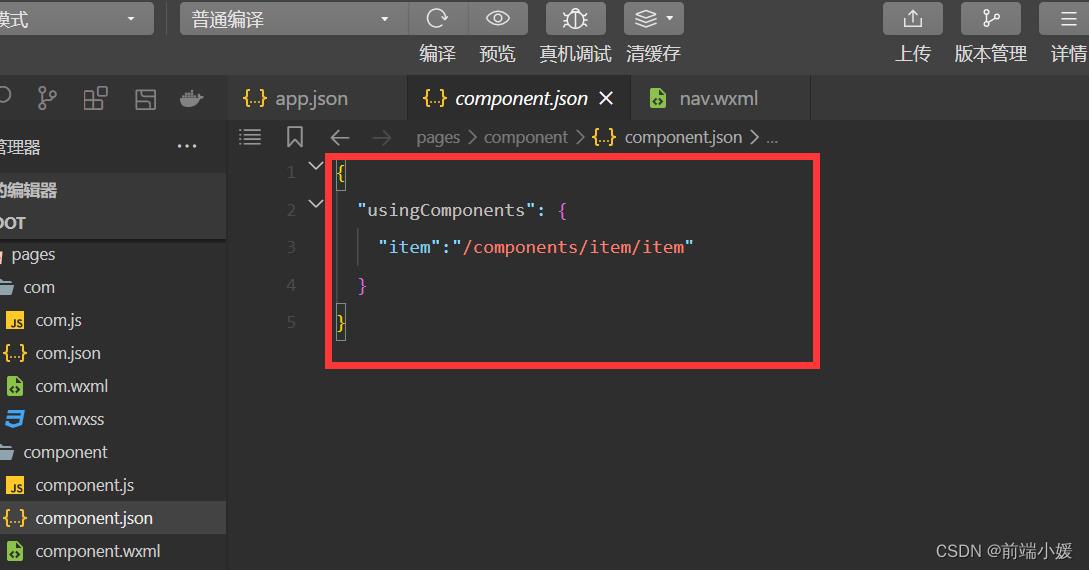
<!-- 引用组件的json文件 -->
"usingComponents":
"cell": "/components/cell/cell"
- 在页面的 wxml 中像使用基础组件一样使用自定义组件(名字和声明的保持一致)
<!-- 引用组件的wxml文件 -->
<!--pages/component/component.wxml-->
<item title="支付" icon="/images/icon01.png"></item>
<item title="相册" icon="/images/icon02.png"></item>
<item title="设置" ></item>
<item title="朋友圈" icon="/images/icon03.png" badge="true" tip="10条消息未读"></item>
<item title="卡包" icon="/images/icon04.png" badge="12" tip="12条消息未读"></item>
<item title="服务" icon="/images/icon05.png" showrslot="true">
<switch checked="true" slot="right" />
</item>
<item>
<view slot="title">插槽title</view>
</item>
<item title="新闻" icon="/images/icon07.png" url="/pages/index/index" open-type="switchTab"></item>
<item title="life" icon="/images/icon08.png" url="/pages/life/life" ></item>
<item title="消息" icon="/images/icon06.png" showrslot="true" itemclass="myitem">
<switch checked="true" slot="right" />
</item>
.myitem
line-height: 120rpx !important;
background-color: #f0f0f0;
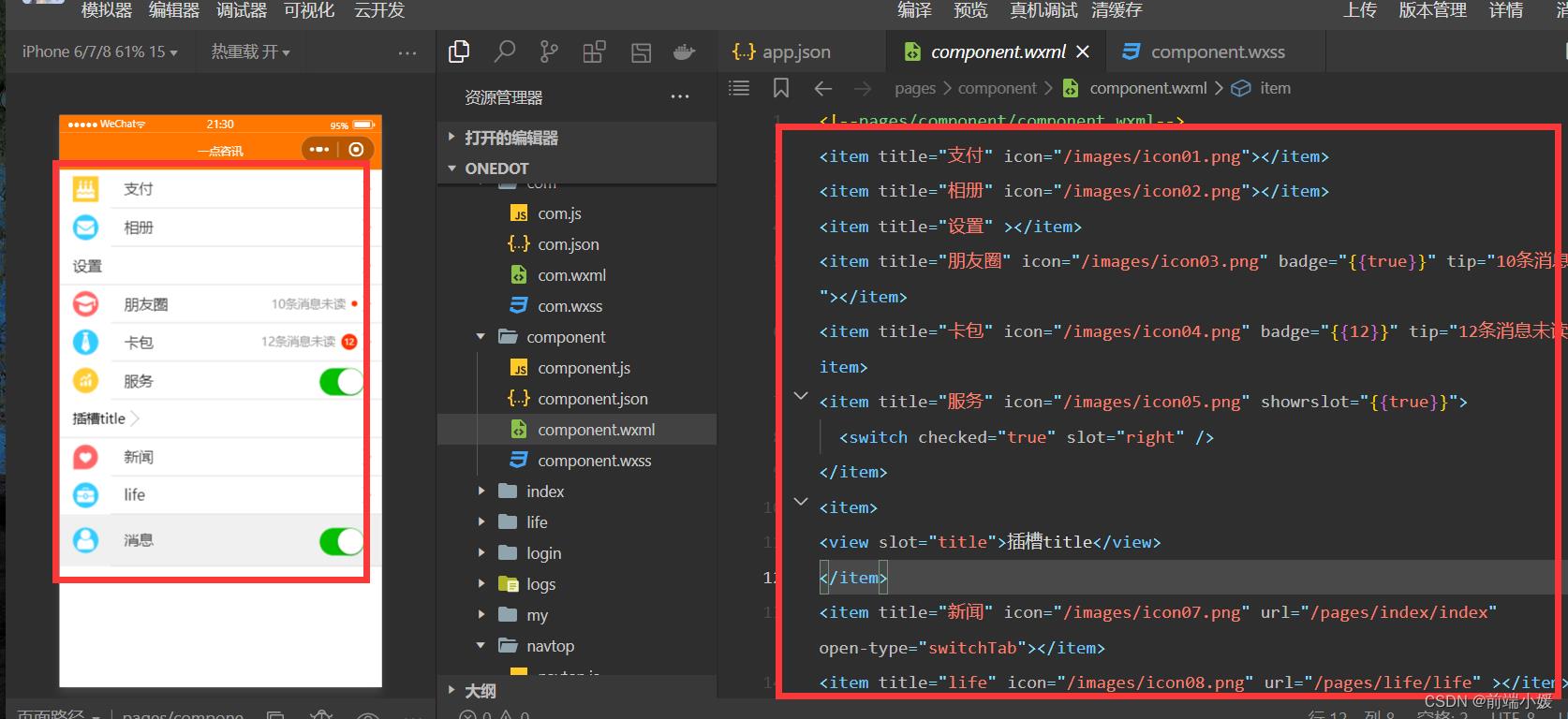
往期传送门
【Vue】描述项目中两个功能模块的业务(一点见解)
【Git】Git基础操作一文详解,入门易懂(附图和案例
【Vue3】整理的一些Vue3知识点和案例(Vue3 获取窗口宽和高)
微信小程序--自定义组件
开发者可以将页面内的功能模块抽象成自定义组件,以便在不同的页面中重复使用;也可以将复杂的页面拆分成多个低耦合的模块,有助于代码维护。自定义组件在使用时与基础组件非常相似。
自定义组件的创建
一个自定义组件由 json wxml wxss js 4个文件组成。
1.json文件中进行自定义组件声明(将 component 字段设为 true 可将这一组文件设为自定义组件):
{ "component": true }
2.在 wxml 文件中编写组件模板:
<view class="inner"> {{innerText}} </view> <slot></slot>
3.在 wxss 文件中加入组件样式:
/*注意:在组件wxss中不应使用ID选择器、属性选择器和标签名选择器。*/ .inner { color: red; }
4.在 js 文件中,需要使用 Component() 来注册组件,并提供组件的属性定义、内部数据和自定义方法。(组件的属性值和内部数据将被用于组件 wxml 的渲染,其中,属性值是可由组件外部传入的):
Component({ properties: { // 这里定义了innerText属性,属性值可以在组件使用时指定 innerText: { type: String, value: \'default value\', } }, data: { // 这里是一些组件内部数据 someData: {} }, methods: { // 这里是一个自定义方法 customMethod: function () { } } })
自定义组件的使用
1.使用已注册的自定义组件前,首先要在页面的 json 文件中进行引用声明。此时需要提供每个自定义组件的标签名和对应的自定义组件文件路径:
{ "usingComponents": { "component-tag-name": "path/to/the/custom/component" } }
2.在页面的 wxml 中就可以像使用基础组件一样使用自定义组件。
<view> <!-- 以下是对一个自定义组件的引用 --> <component-tag-name inner-text="Some text"></component-tag-name> </view>
自定义组件使用时要注意的一些细节:
- WXML 节点标签名只能是小写字母、中划线和下划线的组合
- 自定义组件也可以引用自定义组件
- 自定义组件和页面所在项目根目录名不能以“wx-”为前缀
详细介绍参考微信官方文档
以上是关于小程序微信小程序自定义组件Component详细总结的主要内容,如果未能解决你的问题,请参考以下文章